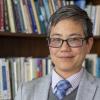This invited blog was originally published with the National Council for Research on Women on July 24, 2009.
This Sunday, July 26 while others will be celebrating National Parent’s Day, I will be honoring my ancestors at the San Francisco Buddhist Temple Obon Festival. Though I have no children of my own, I am, perhaps ironically, the god parent of my Catholic niece and nephew and have played a parental role for my immigrant mother since the day I could speak English. While I recognize the need to honor people who have their own children, I long for a world where we can embrace and respect all types of families and networks of care in which we willingly but more often unwillingly become involved.
Studies show that queers of color in fact live in more households supporting children not necessarily their own as well as elder relatives. Almost all of us, many of whom may not have the funds for expensive sperm donors, surrogate mothers, or adoption processes, always have existing family members starving for care. We devote our time and energy to them. It is not necessarily a romantic picture of love and sensitivity, but a reality check of the ways America makes it difficult for immigrants, people of color, queers, women, and the poor to access the most basic necessities such as healthcare and housing. In a society whose increasing number of seniors is not getting adequate care and in an environment which is woefully feeling the imprint of overpopulation, why would we continue to applaud only people bearing children?
My mother claims care for the elderly is not glamorous because there is no reward. Watching children grow up, gain skills, and fulfill their potential is uplifting, whereas taking care of seniors as they shrink, lose their ability, and slowly fall from their peak could only be depressing. If we believe my mother, we should be supporting if not celebrating the nobility and self-sacrifice of those who voluntarily take care of the elderly. Tax breaks and family health benefits should be more accessible for those who care for their siblings, parents, grandparents, octogenarian aunts and uncles, as well as children other than their own without the formal title of guardian. Yet, little infrastructure supports these people. Often, even the elderly people themselves talk poorly of their care-taking adult children. Albeit it’s done in a self-deprecating way in the immigrant communities with which I’m familiar, there is without a doubt no medal of honor, nor even a free pass for being late for those without children. This Sunday’s Obon gathering reminds us all to take care of our elders and give love to all beings that support us in life and have given us the power to make this world a better place.
